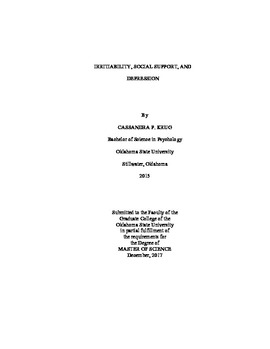| dc.description.abstract | Abstract: Research examining social support in depressed individuals has demonstrated that they are likely to have lower levels of social support (Lakey & Cronin, 2008). Furthermore, interpersonal models of depression posit that depressed individuals engage in behaviors that maintain or further decrease their low levels of social support (Joiner, 2000). Recently, there has been some research examining the presence of irritable mood in depression, and the results suggest that many people experiencing depression also experience considerable irritable mood (Fava et al., 2010; Judd et al., 2013). Irritable mood also erodes social relationships (Smith, Pope, Sanders, Allred, & O’Keefe, 1988; Brondolo et al., 2003), but has not been studied in the context of depression and social support. The present study sought to examine the relationship between depression, irritability, and social support. Participants (n = 194) were recruited using Amazon Mechanical Turk to complete questionnaires measuring depressive symptoms, perceived social support, irritability, and behaviors that erode social support ( i.e. reassurance seeking, negative feedback seeking, interpersonal conflict avoidance). Results provided evidence to support previous findings that depression and irritability were negatively associated with social support. Additionally, an indirect effects model using bootstrapping with 5000 resamples suggested an indirect effect of depression on social support through irritability. Results also suggested that irritable mood contributes to lower levels of social support over and above reassurance seeking, negative feedback seeking, and interpersonal conflict avoidance. The findings of the present study provide further evidence for the relationship between irritable mood and depression. Additionally, although cross sectional in nature, the data suggest a potential pathway from depression to reduced social support through increased irritability. Irritability also provides additional information over and above common erosive behaviors in predicting reduced social support. The findings from the present study suggest that irritability may help maintain depression through the erosion of social support. These findings have potential implications for the development of novel interventions targeting irritability in depression. | |
